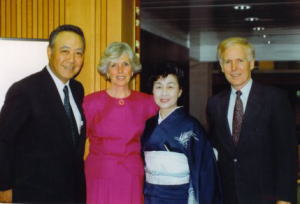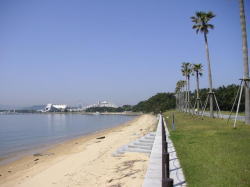 |
| Uminonakamichi Area of Fukuoka City (2007) |
In 1963 I was serving in the US Army and assigned to Brady Base in the Uminonakamichi area of Fukuoka and next to the rustic village of Saitozaki. In my off-duty hours I taught English as a Second Language through the American Cultural Center in Fukuoka. I had students from many walks of life---businessmen, coal mining engineers, students---and was thrilled with my good fortune to be living outside of the United States for the first time in my life, being in Japan and having so many wonderful Japanese friends. At that time I did not know how much my experiences in Japan would change and shape my life and career.
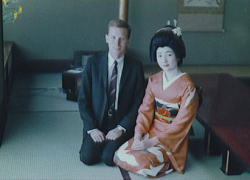 |
| Clarke at Restaurant in Fukuoka in 1963. |
Another very positive aspect of being in Japan was my friendships with
so many young American men who were doing their military service with me.
We were from all over the USA, had varied backgrounds and we got along
very well together. Some of us took Japanese language courses on base or
with Japanese friends, traveled around as tourists to various spots in
Japan, taught English in various locations, and enjoyed active social lives
in Fukuoka and in the not-yet-developed village of Saitozaki from where
we could also take a ferry into Fukuoka, and where many of us rented small
rooms to get away from the military atmosphere of our base.
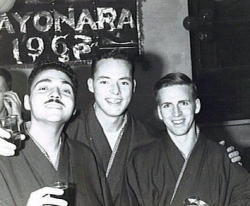 |
Friends Joe Aliteri, Joe Barnes and Jim Spencer
celebrate New Year's Eve at Yoyokaku in 1963 |
At some point, a few of my colleagues met Den* Okochi in a club in Fukuoka and became friends. He and his family had owned the Yoyokaku Inn in Karatsu for many years. By the end of the year, Den very graciously invited his American friends to celebrate a "Sayonara 1963" Party at his Inn, and I was lucky enough to have been included in the group of about twenty. (Note: * Den is Akihiko Okochi's nick name. His real name was too difficult for foreign people to remember, so he wanted himself to be so called.)
Time has dimmed some of the exact memories of that trip, but we took a
train to Karatsu and were greeted royally by Den and his staff. We were
given yukatas to wear to the very elaborate feast that the Inn had prepared
that evening. A very energetic group of musicians played dance music, and
Den had invited some very nice Japanese girls and some people from Karatsu
to join us for the festivities. The following morning we went to the temple
to ask for good luck in the coming year. We also walked around the remains
of Karatsu Castle before returning to Brady Base. That 1963 New Year's
party at the Yoyokaku stands out as one of the best I have ever attended.
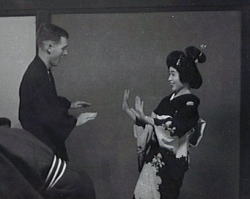 |
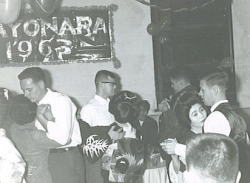 |
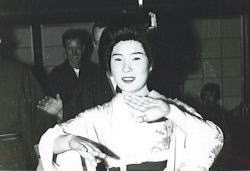 |
Clarke learns a Japanese game
at New Year's Party in 1963
|
Guests dancing at Yoyokaku Party
in 1963
|
Dancer at Yoyokaku Party in 1963.
Clarke in background.
|
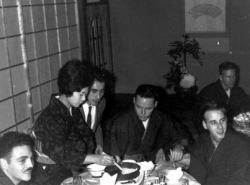 |
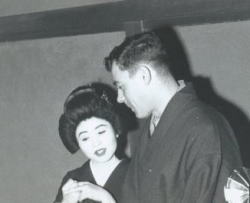 |
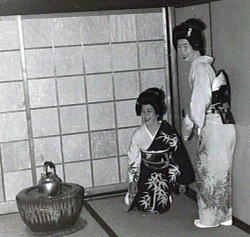 |
Den watches food being served
at Yoyokaku Party in Dec. 1963 |
Gene Nojek learns a Japanese game
at Yoyokaku Party in Dec. 1963 |
Two entertainers at Yoyokaku
New Year's Eve Party in 1963
|
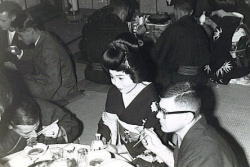 |
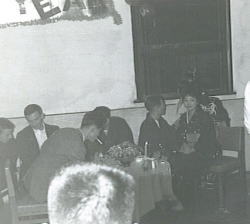 |
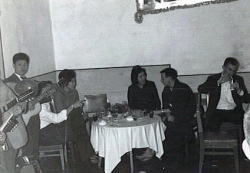 |
Guests enjoying meal at Yoyokaku.
Den drinks some sake! Dec. 1963 |
Guests enjoying party at Yoyokaku.
Den lights a cigarette! Dec. 1963 |
Musicians, Karatsu and American guests at Yoyokaku party. Dec. 1963
|
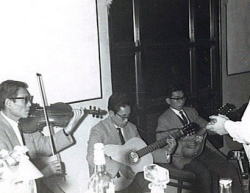 |
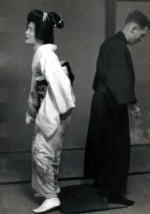 |
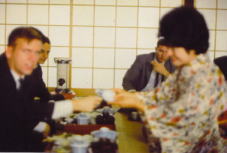 |
Musicians entertain guests
at Yoyokaku party in 1963 |
Clarke learns another Japanese game
at Yoyokaku Party in 1963. |
American guests (Jim Spencer) having breakfast at Yoyokaku
on NewYear's Day, 1964
|
I was very pleased to be living in another country and being exposed to another culture. I was surprised one day to find out from someone at the American Cultural Center that there were careers for Americans who enjoyed working overseas. I investigated these opportunities and decided that the US Department of State sounded just about perfect for me. I took the Foreign Service Exam, and about a year after I left Japan I found myself on an airplane en route to Paris, France where I would have my first assignment at the American Embassy there.
The years passed by as I had hoped they would. My wife, Maria, an American girl I met and married in Paris, and I were assigned to some wonderful postings in several countries. Wherever we went, I was always pleased to find some Japanese people, either at their Embassy or in business, and enjoyed their company. In fact, one of my students from Fukuoka, Toshimasa Sakai, visited us in several countries. The only American colleague from Brady Base that I managed to keep up with was Gene Nojek, who had joined the US Information Agency. He was an important link to the past.
After thirty years in the diplomatic life, my wife and I decided to retire and to move to my hometown of Atlanta GA, which we did in 2000. We joined the Georgia Council for International Visitors and have enjoyed having international visitors including several Japanese to our home. We had been in Atlanta only a few months when I read of a "JapanFest" that would be held over a weekend at Stone Mountain Park. We went, and I was astonished to find that there are about 5,000 Japanese living in Atlanta and about 300 Japanese businesses in Georgia. Many thousands of Georgians turned out to see examples of Japanese culture and to taste Japanese food. I was delighted to find a Fukuoka Booth and to learn that Atlanta and Fukuoka were taking steps to become sister cities.
I spoke with the Chairman of the Fukuoka-Atlanta Association, Sue Renfroe, a native of Fukuoka, and started attending the meetings of this organization that promoted student exchanges and other sister-city-type events. The meetings are held in the Hashiguchi Restaurant that is owned by a man from Fukuoka! Many of the attendees are also from Fukuoka. What a small world.
All of these Japanese-related activities made me think more and more about
my American colleagues at Brady Base, and I wondered what had happened
to them. Gene Nojek gave me a website that he had not used but thought
it might have some information. I found some familiar names, and one old
friend, Ed Rockstein, responded with names of others whom I contacted.
There are now about six of us back in contact, and it is wonderful to learn
about their successful lives and how Japan affected them, too. Several
married Japanese girls, and Bob Rolf is a professor at a Japanese university
in Yokohama. Another small world incident: Jim Spencer married Mayumi Nagai,
a cousin of Den Okochi. Mayumi had attended the 1963 New Year's Eve Party
in Karatsu! Jim has sent me several wonderful letters describing Fukuoka,
Karatsu and the Yoyokaku Inn now over forty years after we were there.
How they whetted my appetite to return to Japan!
.jpg) |
| Jim and Mayumi Spencer |
About that time The New Yorker
Magazine published an article about the author's visit to Karatsu to learn about
tofu-making from a famous chef there and about her very satisfying stay
at the Yoyokaku and how she enjoyed being with Harumi Okochi. This article was another omen for me to travel!
Finally, in February 2007 Atlanta's Mayor, Shirley Franklin, was able to
arrange her schedule to travel to Asia in April 2007 and to pay her first
official visit to Fukuoka, Atlanta's sister city. I was very pleased to
be on her delegation, and the Mayor of Fukuoka, Hiroshi Yoshida, and many
others were very hospitable and informative hosts during our visit.
Fukuoka is now a world-class city. I could only recognize the Tenjin Building area, and the curve of the road that led to Nakasu. I took a ferry boat to Saitozaki that has become a very prosperous town with no reminders of the past other
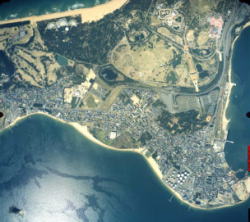 |
| Saitozaki now |
than the view of Fukuoka in the distance. Where my army base had been is
now a large seaside park, and even the topography has changed. I am very
impressed with the improvements to the area and its new, natural beauty.
I took the occasion of my visit to Fukuoka to make a side trip to Karatsu
and to stay at the Yoyokaku, something I had dreamed about doing for many
years. The train trip from Fukuoka showed the beautiful coast line en route to
Karatsu. Blue waters and flowering trees created a very tropical setting.
Someone from the Yoyokaku met me at the station, and soon I was at the
Inn. What a pleasure to meet Harumi-san after our many email exchanges.
Then Den appeared and the forty years melted away. Our reunion was splendid
and we talked for hours.
I was given a very beautiful room at the Inn, overlooking a koi pond, and
various views of stately pine trees.
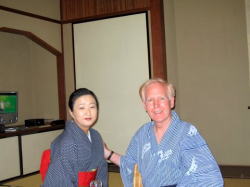 |
Clarke and employee Tamie
at Yoyokaku in April 2007
|
An employee of the Inn made sure I had tea. I put on a yukata and went
to the Inn's large, attractive bath for a relaxing soak. I was served supper
in a ground floor room overlooking some beautiful pines over 100 years
old. The food was not only delicious, but works of art. Course after course
arrived, each one with different visual and taste sensations. I could barely
move because I was so full. That night I slept like a log in my comfortable
futon.
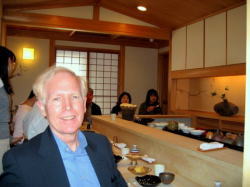 |
Clarke at Kawashima Tofu Restaurant
in Karatsu in April 2007 |
The next morning I was given an equally impressive breakfast, and soon it was time to leave for the Kawashima Tofu Restaurant I had heard so much about. It was very small, had no menu, and the hostess served several courses of tofu prepared in different ways. It was all delicious. We customers began to talk with each other about the food and about ourselves. We were all friends by the time we left.
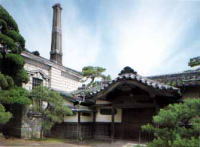 |
| The Takatori House |
I walked around the city of Karatsu, enjoying the architecture, the open
markets and interesting shops. I toured the Takatori House that had been
restored recently. It was a splendid residence of a very wealthy family.
Tapes in English explained all of the items on display and were very helpful.
I walked back to the Inn and en route enjoyed sitting on the beach to admire
the views of the water and in the distance several mountains.
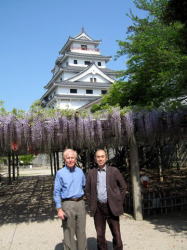 |
Clarke and Den at Karatsu Castl
in April 2007
|
Den took me to see the Karatsu Castle that had not been restored on my
long ago first visit. It is majestic as it overlooks the bay, and we were
fortunate that the large wisteria arbor was in full bloom. Den also took
me to the Hikiyama Kaikan Museum where the floats that are used for the
Kunchi Festival are stored. Some of them are over a 100 years old and are
exquisite. I would like to be in Karatsu for the festival.
I particularly enjoyed just having quiet time at the Inn. My room was so
comfortable and attractive - a perfect place to read and reminisce. The
sitting room and library were pleasant places to watch the activities in
the Inn. Throughout the Inn there are beautiful art works and natural settings.
There are also very impressive exhibitions of the works of master potter
Takashi Nakazato, his son Taki, and his daughter Hanako.
My time at the Yoyokaku was much too short. I wish that I could have stayed
a few extra days in that quiet luxury. But I am happy that I was able to
realize a long-held wish to be there again after forty years, and to find
my friends, Den, and his charming wife, Harumi, in such an idyllic situation.
My next goal, of course, is to return to the Yoyokaku before another 40
years have passed!
|
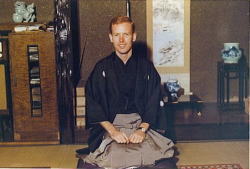
















.jpg)





